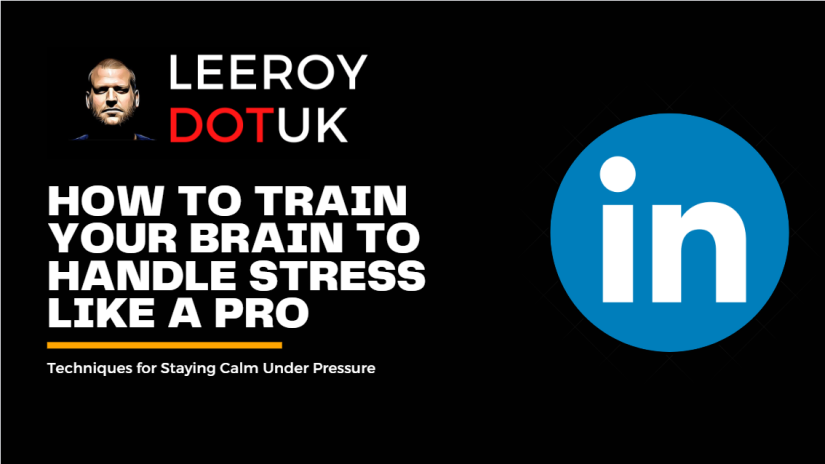How to Train Your Brain to Handle Stress Like a Pro
(Neuroscience-Backed Techniques for Staying Calm Under Pressure)
Handle Stress Like a Pro
Hey Growth fiend,
Yes, this is a newsletter about business and growth strategies.
However, I feel it’s important I also cover the personal strategies that helped me manage myself from the stresses and pains that business (and life, for that matter) bring about.
I used to really suck at handling stress. I wouldn’t even say that I’m perfect at it now.
That being said, I do know what has helped and what hasn’t over the years.
And given that stress can really fuck you up in more ways that one, I feel this is an important one to cover.
Life’s pressure never disappears, they just changes shape over time.
Your business grows, your team gets bigger, the stakes rise, key clients leave without warning, and suddenly, what used to feel like progress now feels like panic in a sharper suit.
But here’s the thing: stress isn’t your enemy. Untrained stress is.
Your brain is wired for survival, not scale.
It evolved to spot tigers in the bushes, not back-to-back investor calls or Google Ads dashboards.
The good news? You can retrain it by rewiring your nervous system, taking back control, and staying calm in chaos.
Let’s break it down.
What Stress Does to Your Brain
When your brain detects a threat (real or imagined), your amygdala lights up.
That’s the brain’s smoke alarm.
It signals your hypothalamus to kick off the HPA axis, the system that dumps cortisol and adrenaline into your bloodstream.
✅ Great in short bursts: it sharpens focus, boosts energy, and primes you for action.
❌ But in business, where the stress is chronic, subtle, and persistent, it fries your memory, ruins your decision-making, and weakens your immune system.
I used to shut down in these moments, searching for things to occupy my mind so that I wasn’t thinking about the problems at hand.
This can form in doomscrolling, to drink or drugs or simply a complete mental shutdown, leaving you unable to tackle or resolve even the most simple of tasks.
Studies show prolonged stress shrinks the prefrontal cortex (the bit that handles decision-making and logic) and enlarges the amygdala, which just makes you more reactive and emotional over time.
Talk about a vicious cycle. So it’s important to get a hold on it sooner rather than later.
Translation? You’ll overthink simple stuff, underperform under pressure, and burn out while spinning your wheels.
But you’re not stuck with that wiring. Let’s rewire it.
The Neuroscience-Backed Way to Rebuild Resilience
1. Train Your Breath Like a Weapon
Breathing isn’t just woo-woo wellness nonsense, it’s your nervous system’s remote control. Take it from someone with experience.
A few years back, I got myself into a medical situation where I had to have my heart restarted.
It knocked me for six mentally.
I developed anxiety around my heart stopping.
This led to a spout of panic attacks, which felt like my heart was about to explode through my chest.
This further confirmed that what I built up in my head was true.
Two things helped me overcome this cycle.
One was a path of only trying to control the controllable (something I have previously written about).
The other was breathing techniques that I thought were a load of horse-shit at the time.
I thought, “Why would I focus on my breathing when I think I’m about to die?”
It’s amazing how the brain can trick you.
In a 2023 Stanford study, cyclic sighing (a specific breath technique involving a deep inhale followed by a second inhale and slow exhale) reduced anxiety more effectively than mindfulness meditation.
🧠 What it does:
- Activates the parasympathetic nervous system
- Tells your brain, “We’re safe”
- Lowers cortisol, slows heart rate, and brings you back to centre
✅ Try this:
- Deep inhale through your nose
- Quick top-up inhale
- Slowly exhale through your mouth (longer than inhale)
- Repeat for 2–5 minutes daily or before high-pressure tasks
2. Use Movement to Flush Stress Hormones
Exercise isn’t just for your waistline. It’s therapy for your nervous system.
When you move, you metabolise stress hormones, release endorphins, and stimulate brain-derived neurotrophic factor (BDNF), a protein that protects your brain against cortisol-related damage.
During my 20s, I was at an athletic level of fitness. I then spent 10 years going down an undesirable path of drink and drugs.
From 40 to 45 (where I am now), I have managed to get my fitness to a level where I feel better than I ever have.
During those 5 years, I have been able to tackle and handle stress at levels I never thought possible.
This is down to three things… experience, mindset (see below) and fitness.
💥 Neuroscientific research out of Harvard shows that just 30 minutes of moderate exercise, 3–5 times a week, significantly improves your emotional regulation and working memory under pressure.
✅ Go for walks. Hit the gym. Stretch.
Don’t wait for the stress to build. Clear it daily like brushing your teeth.
3. Rewire the Story You Tell Yourself (Cognitive Reframing)
Stress doesn’t just come from what’s happening. It comes from how you interpret it.
This is what I was speaking about when I mentioned experience and mindset.
Your brain is a meaning-making machine. So when something bad happens, it builds a narrative fast:
- “I’m failing.”
- “This will ruin everything.”
- “I can’t handle this.”
That narrative triggers more stress. And now your brain is caught in a loop.
🧠 Cognitive reframing breaks that loop. It rewires how your prefrontal cortex processes challenge.
✅ Instead of “This is overwhelming,” train your brain to ask:
- “What’s in my control right now?”
- “What’s this teaching me?”
- “Where’s the growth here?”
Neuroplasticity means the more often you do this, the faster your brain rewires that response. You literally get calmer with practice.
When I mentioned my panic attacks, along with breathing, one of the things I started doing was going for a walk around the block.
During that walk, I would use it as a framing tool where I would walk and say to myself (whilst my heart was racing and felt like it was about to explode):
“If it’s my time, then fuck it, I can’t change that. However if it isn’t, then great, as I’ve got a fuck-ton left to do, so let’s get cracking”.
Reading that might sound silly, but at a time when I thought it was life or death, it meant a lot and allowed me to get over a major roadblock mentally.
4. Anchor Your Brain With Routine
Stress loves chaos. Your nervous system craves predictability.
Having a repeatable structure to your day, even just a solid morning and evening routine, tells your brain:“We’ve got this. There’s a plan.”
📊 Studies show routines improve executive function, reduce stress, and help with sleep quality (which further regulates cortisol).
✅ Build rituals, not just habits:
- Wake up, hydrate, breathe, journal
- Pre-meeting breath work
- End-of-day review + wind-down routine
Discipline breeds freedom. Structure gives your brain space to perform under fire.
5. Sleep Like It’s a Revenue-Generating Activity
You can’t talk about stress without talking about sleep.
Miss sleep, and your cortisol levels skyrocket.
Your amygdala becomes hyperactive, and your ability to regulate emotions tanks.
🧠 Neuroscience from the University of California Berkeley shows that just one night of poor sleep increases emotional reactivity by 60%.
✅ The founder cheat code:
- 7–8 hours of sleep (non-negotiable)
- No screens 60 mins before bed
- Magnesium, low lighting, and a hot shower help
Sleep isn’t lazy. It’s an elite strategy.
Train in Recovery Like a Professional Athlete
You’re not a machine. You’re an elite performer.
Athletes train hard, but they recover harder. The same applies to you.
Every day, you’re making high-stakes decisions, absorbing pressure, and dealing with ambiguity. That’s elite-level work. Your brain needs recovery cycles to stay sharp.
✅ Weekly stress circuit:
- 1 x full day off (no work, no checking in)
- 1 x tech-free walk or nature escape
- 2 x breathing or meditation sessions
- 1 x social connection that isn’t about business
Treat recovery like a KPI. Because without it, your performance will drop.
Look, You Can’t Avoid Pressure, But You Can Train For It
The thing about all of this is that you won’t exactly fix everything overnight. It’s a matter of small, incremental habits that begin to gather momentum the more you do them.
Pressure doesn’t care how smart you are. It’ll break the brilliant and reward the calm.
The founders who rise? They build stress-resilient brains. They don’t just “cope”, they train. They turn breath, movement, mindset and recovery into a system.
They show up calm in chaos, not because they were born that way, but because they trained that way.
So here’s the question: Are you training like a pro or winging it like an amateur?
Your business won’t rise higher than your nervous system can handle. Train it. Daily. That’s how you lead under pressure.
Stay sharp, stay curious, and keep testing. And remember… you’re closer than you think.
Leeroy Founder, Investor, Coach
How Can I Help?
My Business Growth Newsletter – LeeroDotUK (47K subs) (FREE)
Business Growth Program- Ascend10X (£99 P/M)
Done With You Business Growth – MarGen (£5-20K P/M)
365 Growth & Networking For Men – CLICK HERE (£99 One-Off cost)
Follow me on LinkedIn, Connect with me on Twitter




